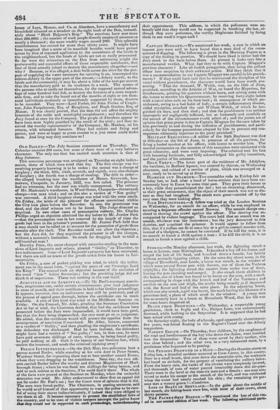OLD BaieEr.—The July Sessions commenced on Thursday. The Calendar contains
208 cases, but none of them were of a very heino us character. The only one that has excited much attention is that of Ikey Solomon&
This notorious personage was arraigned on Thursday on eight indict- ments, three of which were tried that day. The first charge was for receiving property knowing it to be stolen ; the second was a charge of
burglary ; the third, fifth, sixth, seventh, and eighth, were also charges of burglary; the fourth was a charge of stealing. The fifth in order—
the alleged breaking into the warehouse of Messrs. Growcock, lace- makers, Cheapside, in January, 1827, was first called. The prisoner had no witnesses, but the case was wholly unsupported. The robbery of Mr. Mackenzie's warehouse, in Wood Street, Cheapside—the seventh charge—was next tried ; and on this also a verdict of " Not guilty" was returned. A third burglary charge was tried withahe same result. On Friday, the :trials of -the prisoner for offences committed within the City took plaCe before the Recorder. In one, the 'prosecutor 'was dead, and the chief witness not to be found. The Judge directed an acquittal. In two other cases of presumptive robbery, Mr. Charles Phillips urged an objection admitted the day before by Mr. Justice Park ----that the presumption was in law removed by the length of time the goods had been in the prisoner's possession. Mr. Justice Park held that a man should not be called on to account for the possession of goods three months after the theft. The Recorder would not allow the objection ; but the Jury did, for they acquitted the prisoner in all the charges, without a moment's hesitation. So much for dragging back to trial a self-banished man !
Dorothy Fenn, the nurse charged with extensive stealing in the man- sions of Lord Ingestrie and others, pleaded " Guilty," on Thursday, to two indictments. Some of Lord Ingestries property hasbeen recovered, but there are still no traces of the jewels stolen from his house in Lei- cestershire.
On Friday, a case of pocket-picking was tried, in which the indict- ment ran in the usual form, "against the peace of our Sovereign Lord the King." The counsel took an objection because of the omission of the word "late " before Sovereign ; but the presiding judge did not think it of importance. There was nothing in the case itself.
ACQUITTAL AND NO ACQUITTAL.—By Mr. Peel's summary convic- tion, magistrates can, under certain circumstances, give final judgment in cases of assault, and their certificate is held to bar farther proceedings. It appears, however, that an indictment may still be preferred, and all the process of appeal gone through, before the certificate can be made available. A case of this kind was tried at the Middlesex Sessions on Friday. On the Counsel, Mr. Alley, pleading the Summary Conviction Act in bar of trial, the Chairman decided, that had the certificate been presented before the Jury were impannelled, it would have been good, but that the Jury being impannelled, the case must go on to judgment. He added, that the certificate would still protect the appellee from the consequences of conviction if convicted. Mr. Alley, hereon, consented to a verdict of " Guilty;" and then pleading the magistrate's certificate, the defendant was discharged. Had he been inclined, the defendant might have had a verdict of " Not guilty;;" but, in that case, he must have paid seventeen shillings of costs, whereas, by being found guilty, he paid nothing at all. Such is the beauty of our Sessions law, which
• mulcts the innocent, and sends the criminal rejoicing away !
POLICE INTERFERENCE.—OR the 25th May, two policemen beat a person named Butler, while standing at his own door in Peter Street, Wardour Street, for requesting them not to beat another named Evans, whom they were dragging to the watchhonse. Next day, the two offi- cers carried Butler before the worthy and discreet Magistrates of Marl- borough Street ; where he was fined ten shillings for being beaten, and told to seek redress at the Sessions, if he could find it there. The whole of the facts were proved at the Sessions on Monday, when the unlawful detention was tried. Mr. Alley endeavoured to show that an appeal did not lie under Mr. Peel's act ; but the Court were of opinion' that it did. The men were found guilty. The Chairman, in passing sentence, said he would avail himself of that opportunity to warn the police to be care- ful' of using their staves indiscriminately, if indeed they. were obliged to use them at all. It became necessary to protect the established laws of the country, and to let men of violent tempers amongst the police know AM they would not be supported in such proceedings, notwithstanding their appointment. This address, in which the policemen were so- lemnly told that they would not be supported in breaking the law, al- though they were policemen, the worthy Magistrate finished by fining them in one week's wages each !


























 Previous page
Previous page